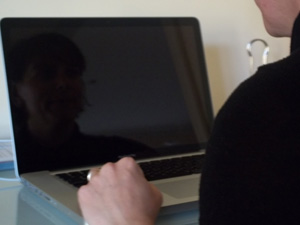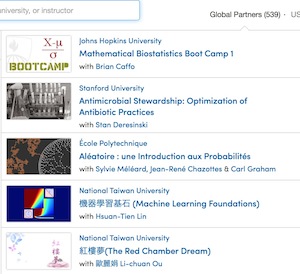
Elena has prepared a useful article about MOOC, a very important resource for students and not only…
For the past year and a half, it has been possible to attend university courses organized by some of the most prestigious American universities, while comfortably sitting in an armchair at home and totally for free. No, this is not a joke, they’re called MOOC- Massive Open Online Courses.
The most active and popular platforms that offer these courses are Coursera, EdX and Udacity, but many more are being created following the success of the project.
How They Work
The course is entirely online so all you need is a computer and a good Internet connection.
To join a course you must register in the website you select, choose a username, a password and give your e-mail address. Then all you have to do is wait for the course to start! Duration of the courses varies from four to 12-14 weeks and they usually offer:
- video-classes
- quizzes
- homework
- discussion forums, and
- reading materials
Since they are called massive, meaning that one course can have tens of thousands of participants, correction of homework is based on peer review. This means that your homework is read and evaluated by other participants following a scale proposed by the teacher. In order to continue within a course, you must engage and evaluate homework done by others.
At the end of the course you will receive a course certificate. Generally, the evaluation guidelines that determine obtaining the certificate are communicated when the course starts. If your results are above 90% on the evaluation scale, you will obtain a statement of accomplishment with distinction.
Some courses offer a special enrollment which allows you to identify the participant. This is called signature track or verified identity and by paying a reasonable sum (approximately $90 USD) your identity is verified and associated to the course results. The advantage of this type of status is that some universities start recognizing these courses as “credits” in order to access and complete a study course with the university itself.
What type of courses do they offer?
There are lots of topics and the choices are vast. For instance, Udacity mostly proposes technical/scientific courses such as physics, informatics, artificial intelligence, and web development just to name a few. EdX gathers courses from the most prestigious universities such as Harvard, MIT, and Berkeley. Courses are extremely varied, from various sciences to literature, from arts to philosophy. There is also a very interesting introduction course called EdX Demo which explains how MOOC functions. This course lasts thirty minutes and is perfect for those who want to understand how things work before joining one of the courses. Coursera also offers a wide variety of topics and themes. At the time of this article, there are 538 course offers, 475 in English and 25 in Chinese, followed by a few courses in French, Turkish, and German. Today, I read that EdX has started a project called Edrack, supported by Queen Rania of Jordan, in order to open the platform to the Arab world. This was started by translating a few of the courses offered by American universities and then moved on to include courses offered by Arab universities. Gradually, a whole empire is being built.
Benefits
The first benefit is comfort. For expat families like ours, being able to follow quality courses without residing in the country where they’re given is a huge advantage. Moreover, you don’t have to leave your house to attend classes or take an exam – you can follow the course in your free time without giving up your work or time with your family.
Courses are usually structured in such a way so they are accessible by everyone, and do not require a specific background. I find this a big advantage for expat women who, at some point in our lives, must change careers. Maybe we were engineers and now we’re teachers, or we studied economics but now we want to reinvent ourselves and become chefs. Starting with a MOOC to help redesign our career could be the perfect way to begin.
 Weak points
Weak points
The most difficult aspect is the absence of direct contact with the teachers. Even if there is a forum where topics are discussed, you can’t receive specific and direct answers from the course teachers. The course gives total autonomy in the organization, therefore proven organizational skills are essential and the feedback on your work is not always efficient. In my experience, the peer review worked well when corrections to my work were honest, accurate and useful for improving myself. However, I must admit that sometimes I would have loved to have had a more “professional” opinion and feedback which only a teacher can provide. However, this is impossible to obtain when 60,000 students have joined the same course!
Language is also an important element to consider. Presently, most of the courses are in English. If your level of English is not good enough to follow a lesson or read the texts, attending the course becomes impossible. However, if you have a high level of oral English and want to improve your written performance, or you want to make sure you have the level required to enter a university course in English, there are courses that give you this opportunity, for instance College Writing offered by Edx.
Who can take these courses?
These courses are for everyone. They do not, at least for the time being, replace an actual university course. Presently, they are not even recognized even by the universities themselves, yet some U.S. universities are thinking about it.
I personally don’t think that these courses are the best way to approach university for the first time. I would certainly suggest a more structured and more organized or controlled course to a young person who has just completed high school. On the other hand, I find these courses very innovative and interesting for whoever wants to keep up-to-date and possibly deepen a useful topic for her profession or try a career change. MOOC has a lot to offer teachers and Coursera has launched a section of professional updating for teachers, which is rich and interesting. I believe schools should start to use these courses liberally as they would allow teachers to save time and money and keep them updated. At the same time, teachers who attend the same course as others in their school would be able to interact, thus removing the lack of personal contact that online courses can’t provide.
Do you need to freshen up on those mathematical principles you studied at university and have forgotten after a couple of children and relocations? No problem, you can find algebra, statistics, gaming courses, and much more through MOOC. It’s also interesting to be able to approach new disciplines you plan to study in depth in the future such as psychology, social sciences, informatics, music or literature.
 MOOC for the expat
MOOC for the expat
As I said above, I think these types of courses can prove very useful for expats, as well as our children who discover the university world. Besides offering a chance to stay updated and change your career direction, they have other advantages. They allow us to have contact and try study methods and different evaluation modes used in the Anglo-Saxon systems. For instance, for those who have received a diploma in Italy or for our expat children who finished high school in a specific system and then decide to attend, for example, a U.S. university, it is very important to know how you approach the writing of an essay or thesis, or how to approach a test or a written assignment. Certainly differences are not purely linguistic, but deeply cultural, and understanding them can be very useful both to start university and to better understand written documents you handle in everyday life.
Another expression of a cultural encounter can be found in history or literary courses. I have found it extremely interesting to follow a course on the history of music. On the one hand, I have been able to deepen my understanding of the English language, and on the other, I have also been able to understand cultural differences that exist between Italian conservatories and American universities when it comes to teaching instrument techniques and the history of music. Two of the courses that I followed updating teachers proved to be efficient and productive. A very important element for me as an expat teacher has also been being able to get in touch with teachers from every part of the world through the discussion forums. It has been very interesting to have contact with teachers in China, who in a course based on critical thinking, shared their experiences of a country where culturally you can’t question the teacher, or with schools where the most innovative methods of virtual teaching are a well established reality.
An interesting infographic on Moocs: https://www.bestcollegesonline.org/moocs/





